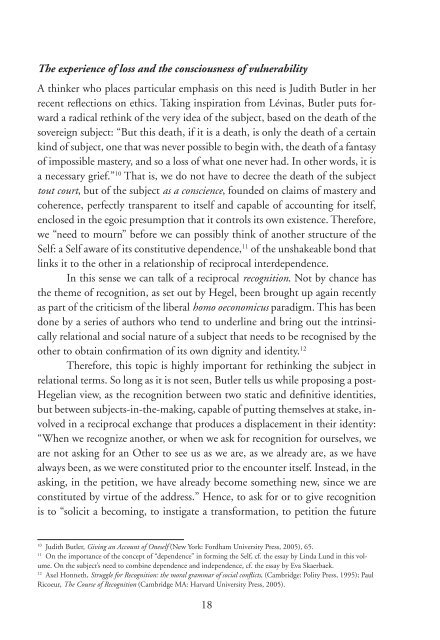Teaching Subjectivity. Travelling Selves for Feminist ... - MailChimp
Teaching Subjectivity. Travelling Selves for Feminist ... - MailChimp
Teaching Subjectivity. Travelling Selves for Feminist ... - MailChimp
You also want an ePaper? Increase the reach of your titles
YUMPU automatically turns print PDFs into web optimized ePapers that Google loves.
The experience of loss and the consciousness of vulnerability<br />
A thinker who places particular emphasis on this need is Judith Butler in her<br />
recent reflections on ethics. Taking inspiration from Lévinas, Butler puts <strong>for</strong>ward<br />
a radical rethink of the very idea of the subject, based on the death of the<br />
sovereign subject: “But this death, if it is a death, is only the death of a certain<br />
kind of subject, one that was never possible to begin with, the death of a fantasy<br />
of impossible mastery, and so a loss of what one never had. In other words, it is<br />
a necessary grief.” 10 That is, we do not have to decree the death of the subject<br />
tout court, but of the subject as a conscience, founded on claims of mastery and<br />
coherence, perfectly transparent to itself and capable of accounting <strong>for</strong> itself,<br />
enclosed in the egoic presumption that it controls its own existence. There<strong>for</strong>e,<br />
we “need to mourn” be<strong>for</strong>e we can possibly think of another structure of the<br />
Self: a Self aware of its constitutive dependence, 11 of the unshakeable bond that<br />
links it to the other in a relationship of reciprocal interdependence.<br />
In this sense we can talk of a reciprocal recognition. Not by chance has<br />
the theme of recognition, as set out by Hegel, been brought up again recently<br />
as part of the criticism of the liberal homo oeconomicus paradigm. This has been<br />
done by a series of authors who tend to underline and bring out the intrinsically<br />
relational and social nature of a subject that needs to be recognised by the<br />
other to obtain confirmation of its own dignity and identity. 12<br />
There<strong>for</strong>e, this topic is highly important <strong>for</strong> rethinking the subject in<br />
relational terms. So long as it is not seen, Butler tells us while proposing a post-<br />
Hegelian view, as the recognition between two static and definitive identities,<br />
but between subjects-in-the-making, capable of putting themselves at stake, involved<br />
in a reciprocal exchange that produces a displacement in their identity:<br />
“When we recognize another, or when we ask <strong>for</strong> recognition <strong>for</strong> ourselves, we<br />
are not asking <strong>for</strong> an Other to see us as we are, as we already are, as we have<br />
always been, as we were constituted prior to the encounter itself. Instead, in the<br />
asking, in the petition, we have already become something new, since we are<br />
constituted by virtue of the address.” Hence, to ask <strong>for</strong> or to give recognition<br />
is to “solicit a becoming, to instigate a trans<strong>for</strong>mation, to petition the future<br />
10<br />
Judith Butler, Giving an Account of Oneself (New York: Fordham University Press, 2005), 65.<br />
11<br />
On the importance of the concept of “dependence” in <strong>for</strong>ming the Self, cf. the essay by Linda Lund in this volume.<br />
On the subject’s need to combine dependence and independence, cf. the essay by Eva Skaerbaek.<br />
12<br />
Axel Honneth, Struggle <strong>for</strong> Recognition: the moral grammar of social conflicts, (Cambridge: Polity Press, 1995); Paul<br />
Ricoeur, The Course of Recognition (Cambridge MA: Harvard University Press, 2005).<br />
18

















